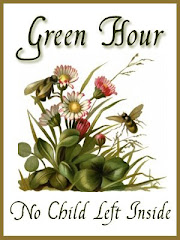Maximum Nutrition Gardening
I got some of my garden plants started a couple of weeks ago, and I am now enjoying watching the lettuce and tomato babies peeking up out of the soil and blinking at the sunlight. It brought to mind a post I started last year when I was exploring this whole "how to garden" thing, and I thought I'd finish it up, finally. A year has passed and, oddly enough, the post morphed from what it was. Funny thing what a year's experience can do, isn't it?
When I first got interested in gardening, a little over a year ago, my goal was to provide my family with the highest possible nutrition. I had read that current commercial farming methods had resulted in the reduction of nutrient value (according to the FDA) of various fruits and vegetables by an average of 40%. That's pretty alarming! It means that at a time when, because of all the competing manufactured foods, we are having to work harder than my mother's generation did just to get fresh fruits and vegetables into us, we are also benefiting less from them.
I looked into why that might be and discovered that commercial farming typically returns to the soil only three of the nutrients (nitrogen, phosphorous, and potassium) that plants need to grow and be healthy. The micro-nutrients are gradually removed from the soil by the growing plants and shipped off in the fruits and vegetables. The next year, the plants have fewer of the nutrients available to them. If it's not in the soil, it can't be in the food we grow on the depleted soil, which means that each year, the fruits and vegetables have fewer vitamins than the year before, leaving the soil more and more depleted over time, both of minerals and of the microbes that help to make those minerals available to the plants growing there.
An analogy to this soil depletion may be found in raising a child entirely on fast food. A steady diet of fast food contains the three major nutrients a child needs to grow (protein, carbohydrate, and fat) and the child will grow up without starving to death, but it's completely lacking in many of the vitamins and minerals a child needs to be really healthy.
I looked into organic gardening and it looked like a great improvement, but it can still be an incomplete solution. Compost is a great addition to the soil, but too many leaves or too much manure can unbalance the soil with far too much phosphorous and potassium, while if the composted plants were grown on depleted soil, they won't contain all the minerals and micro-nutrients the plants need, either. This might be the equivalent of raising a child on home-cooked meals featuring some processed foods and some fruits and vegetables. This child will be in far better health than the child raised entirely on fast foods, but it still isn't optimal nutrition and can leave the child more susceptible to degenerative disease later in life. I want more for my family.
So, I went hunting for information about how to supplement the soil so that all the nutrients a plant needs for optimal health are available in my garden. If the nutrients the plant needs are available, the vegetables and fruits will contain as much nutrition as possible, meaning that my family will also be nourished as much as possible by the produce we eat.
Now, plants don't need "vitamins" the same way that humans do. Plants use minerals, with the help of soil microbes, to create the vitamins we need. The best way to get the nutrients to the plants is to remineralize the soil by providing a wide range of "soil amendments" so that a wide variety of nutrients are made available.
It's pretty complicated to do it the "scientific" way, with soil tests and brix testing, and PH testing, with the amendments varied for the specific needs of the specific soils and changing over time to meet changiong needs. Eventually I want to get to the point of understanding all that, but in the meanwhile, I tried a scatter shot approach last year, based on the general principles I have learned. I got some astonishing results.
In the year before last, Rod had planted some vegetables. Basically, he put seeds and some baby plants in the garden and kept them watered and did little else. It was our experiment in "what happens if". What happened? Not much. Most of the seeds never grew and many of the plants died before they ever fruited. Probably many of them were lovely salad greens for our furry neighbors, but the ones that survived never got very big and none were terribly productive. They looked sad and listless and droopy. Now, we do have a friend who has used this method very successfully for many years, but our soil was simply not up to it.
Last year, I decided to circumvent the furry neighbors problem by starting the seeds indoors very early and keeping them out of harms way until they were big enough to survive an experimental nibble by the rabbits. (I planted most of them after the six-leaf stage.)
I also added a lot of soil amendments to the garden.
-
alfalfa - because alfalfa is a very deep-rooted plant, it brings minerals up from deep in the earth, well below where most plants can reach. It provides many minerals but it also provides a plant growth stimulating enzyme that makes plants sturdier.
-
kelp - because sea-weed grows immersed in the ocean, which is a rich source of minerals, it can add back minerals that are relatively rare in the soil, especially iodine and it is an excellent source of "hummus", which stimulates the microbes that keep plants healthy.
-
rock dust - this takes longer to break down and I don't know whether it would have made a big difference last year, but it will help to re-mineralize the soil over the long term.
-
manure - adds a huge amount of "organic matter" to the soil, which is critical to the happiness of the plants and the microbes who feed them
-
bone and blood meals - a ready source of many minerals
I also added an "inoculant" -- a shot of the microbes the plants need. They will eventually find your garden if the conditions are right, but I wanted to jump start them.
Over the course of the summer, I fed the plants "cow poop soup" -- what other people call "compost tea". I put a couple of handfuls of manure and a couple of handfuls of alfalfa in a five gallon bucket of water and let it steep int he sun for three or four days. Then I poured some around each plant once a week. (nutrient drenching)
I also sprayed the plant leaves with a fish and kelp emulsion (foliar feeding) once a week.
The result was a vibrant garden with huge, productive plants and little trouble with pests.
I can't say for certain that the plants were more nutritious than they would have been otherwise, but I can say that while we had trouble keeping up with production, we had almost no spoilage all summer even though vegetables sometimes sat on the counter for weeks after harvesting. (Produce that some friends gave us had to be eaten immediately because it didn't last well.) As a matter of fact, our last butternut squash is still sitting on the counter seven months later, waiting to be cooked --and it has not yet started to spoil. (We ate another one a few weeks ago, and it was still firm, delicious, and quite fresh tasting.) Long lasting produce is said to be one of the hallmarks of nutrient density, so I think we're moving in the right direction.
This year, I'd like to get a brix meter to see whether the produce is actually as high quality as it seems to be. But you know, brix meter or no, this is already worthwhile. By nourishing my plants with the same thought and care that I nourish my family, not only does my family have better, healthier food, but I found out that I really LOVE gardening!!
For more information, have a look at these sites:
Gardening for Maximum Nutrition
High Brix Gardens
They have a kind of "true believer" tone to them that I found offputting at first, but in amongst the hyperbole, I did find a lot of excellent information.


























